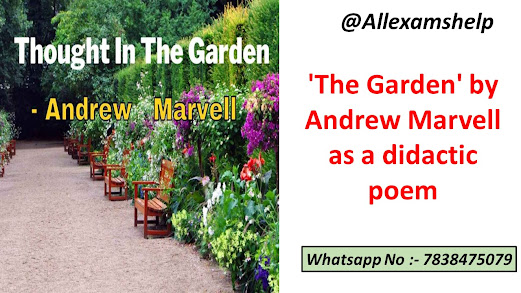"The Garden" by Andrew Marvell can be considered a didactic poem due to its instructive and moralizing elements. Marvell uses the garden as a metaphorical space to explore various themes and impart lessons to the reader. The poem consists of 50 stanzas, each presenting a distinct aspect of the garden and offering valuable insights.
One of the
didactic aspects of the poem lies in its portrayal of the garden as a symbol of
human life and existence. Marvell emphasizes the transient nature of life and
the inevitability of death. He underscores the need to appreciate the present
moment and make the most of our time on earth. This serves as a reminder to the
reader to prioritize the things that truly matter and not be consumed by
fleeting pleasures.
'The Garden'
by Andrew Marvell as a didactic poem
Additionally,
Marvell conveys the idea of human agency and the importance of free will. He
presents the garden as a place where choices are made and actions have
consequences. Through his vivid descriptions of the garden's flora and fauna,
he encourages the reader to take responsibility for their own actions and
decisions. This moral lesson reinforces the notion that our choices shape our
lives and the world around us.
Furthermore,
"The Garden" explores the theme of the relationship between humanity
and nature. Marvell reflects upon the harmony and balance that exist in the
natural world and suggests that humans should strive to emulate it. He
highlights the destructive tendencies of human intervention and advocates for a
respectful and harmonious coexistence with nature.
In terms of
form, the poem's didactic nature is also evident in its structure. Marvell
employs a consistent rhyme scheme and meter throughout the poem, which lends a
sense of order and control. This structured form reflects the didactic purpose
of the poem, as it conveys a sense of discipline and organization in the
presentation of its moral lessons.
Overall,
"The Garden" by Andrew Marvell can be viewed as a didactic poem due
to its instructional nature and the moral lessons it imparts. Through its
exploration of life, death, free will, and the relationship between humanity
and nature, the poem encourages the reader to reflect upon their own existence
and make informed choices.
"The
Garden" by Andrew Marvell is a didactic poem that imparts instructive and
moralizing elements to the reader. Marvell utilizes the garden as a
metaphorical space to explore various themes and offer valuable lessons.
In the poem,
Marvell presents the garden as a symbol of human life and existence. He
emphasizes the fleeting nature of life and the certainty of death. Through this
portrayal, Marvell encourages the reader to appreciate the present moment and
make the most of their time on Earth. This serves as a reminder to prioritize
meaningful pursuits and not be consumed by transient pleasures.
Another
didactic aspect of the poem is the emphasis on human agency and free will.
Marvell portrays the garden as a place where choices are made and actions have
consequences. He prompts the reader to take responsibility for their decisions
and recognize the impact of their actions. This moral lesson encourages
individuals to make wise choices and consider the repercussions of their
behavior.
Furthermore,
"The Garden" explores the relationship between humanity and nature.
Marvell reflects upon the harmony and balance found in the natural world and
advocates for a respectful coexistence with nature. He highlights the
destructive tendencies of human intervention and urges the reader to cultivate
a harmonious relationship with the environment. This serves as a didactic
reminder to value and preserve the natural world.
In terms of
form, the poem's structure contributes to its didactic nature. Marvell employs
a consistent rhyme scheme and meter throughout, creating a sense of order and
control. This structured form aligns with the didactic purpose of the poem,
conveying discipline and organization in the presentation of its moral lessons.
Overall,
"The Garden" by Andrew Marvell is a didactic poem that imparts
instructive and moral lessons to the reader. Through its exploration of life's
transience, human agency, and the relationship between humanity and nature, the
poem encourages introspection and the pursuit of meaningful actions.
For SOLVED PDF &
Handwritten
WhatsApp No :- 8130208920
